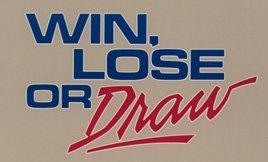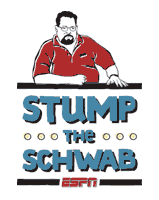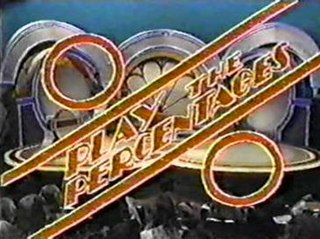Related Research Articles

SmartAsk is a Canadian quiz show which ran for three seasons on CBC Television. The show was taped in front of a live audience, with the players sitting on a tiered set. The SmartAsk tournament was described by Ralph Benmergui, the show's executive producer, on TSN's Off The Record as being "Reach for the Top on acid," although in practice this largely involved crude humour, especially as the show went on and ratings sagged.

Win, Lose or Draw is an American television game show that aired from 1987 to 1990 in syndication and on NBC. It was taped at CBS Television City, often in Studios 31, 33, and 43 at various times. It was co-produced by Burt & Bert Productions and Kline & Friends for Disney's Buena Vista Television. It has also had two versions on The Disney Channel: Teen Win, Lose or Draw from 1989 to 1992, and a revived version known as Disney's Win, Lose or Draw which aired in 2014. New York described Win, Lose or Draw as "a knockoff" of the board game Pictionary.

Hot Potato is a television game show that was broadcast on NBC in the United States from January 23 to June 29, 1984. From April 23 until its conclusion, the show was known as Celebrity Hot Potato.

Russian Roulette is an American game show created and executive produced by Gunnar Wetterberg that ran for two seasons on Game Show Network from June 3, 2002 to June 13, 2003. The show was hosted by Mark L. Walberg and announced by Burton Richardson.

Twenty-One was an American game show originally hosted by Jack Barry that aired on NBC from 1956 to 1958. Produced by Jack Barry-Dan Enright Productions, two contestants competed against each other in separate isolation booths, answering general-knowledge questions to earn 21 total points. The program became notorious when it was found to be rigged as part of the 1950s quiz show scandals, which nearly caused the demise of the entire genre in the wake of United States Senate investigations. The 1994 film Quiz Show is based on these events. A new version of the show aired on NBC in 2000 with Maury Povich as host.
Idiot Savants was an American television game show on the MTV network which ran from December 9, 1996 to April 25, 1997. It was created by Michael Dugan and Chris Kreski, directed by Steve Paley, and hosted by comedian Greg Fitzsimmons.

Stump the Schwab is an American game show that aired on ESPN2 and ESPN Classic from July 8, 2004 to September 29, 2006. The show featured three contestants trying to defeat Howie Schwab, ESPN's first statistician, in a sports trivia contest. Stuart Scott was the show's host. The show also appeared on Canada's The Score Television Network.

Test Pattern was the first game show on the Canadian television channel MuchMusic in the late from 1989 into the early 1990s. The music and sound man was Bill St. Amour. The show's announcer was Bill Carroll. It occasionally featured Canadian musicians who were prominent at the time. Dan Gallagher hosted the program and it was produced and directed by Sidney M. Cohen. The show was cancelled after two seasons. Reruns currently air Mondays and Fridays on GameTV. Reruns of episodes from the show's second season also aired during the summer of 2003 on MuchMoreMusic.

Dream House is an American game show that saw contestants competing to win, as the title of the show indicates, a new house. The show originally premiered in primetime on ABC on March 27, 1968, with a daytime edition premiering on April 1, 1968. The primetime series aired weekly until September 19, 1968 and the daytime series aired daily until January 2, 1970, when it was replaced with All My Children. The daytime series was revived for NBC's daytime schedule and premiered on April 4, 1983, running until June 29, 1984.

Play the Percentages is an American game show hosted by Geoff Edwards which aired in syndication from January 7 to September 12, 1980. Jay Stewart announced for the first six weeks, after which Bob Hilton became the permanent announcer.
Trivial Pursuit is an American game show that ran on The Family Channel from June 7, 1993, to December 30, 1994. Loosely based on the board game of the same name, it was hosted by Wink Martindale with Randy West announcing.

Miljoenenjacht, officially Postcode Loterij Miljoenenjacht, is a Dutch game show, sponsored by the country's postcode lottery, where a contestant and at-home viewer could win up to €5,000,000 or as little as €0.01. The show is broadcast at various times, spanning across six episodes for each set. The program was originally shown by TROS on NPO 2, but moved to creator John de Mol's channel Tien in 2005. After the channel was discontinued after its sale to the RTL Group, the program moved to RTL 4. In 2019, the program moved to SBS6 due to the transfer of Linda de Mol from RTL to SBS.
Sale of the Century was a British game show based on a US game show of the same name. It was first shown on ITV from 9 October 1971 to 6 November 1983, hosted by Nicholas Parsons. Special Celebrity Sale of the Century editions aired occasionally, starting on 2 January 1981 with Steve Jones as host.

Family Feud was an Australian game show based on the American show of the same name. It aired on Network Ten from 14 July 2014 until 22 July 2018 and in August 2020 for a special 10-episode series. The show was hosted by Grant Denyer. This was the fourth Australian version of the format, the previous incarnation being Bert's Family Feud hosted by Bert Newton in 2006. Ten became the third network to adapt the format. From 2016, Ten also screened a celebrity edition titled All Star Family Feud. The show was filmed at Global Television Studios in Southbank, Melbourne from 2014 to 2017 and at Network Ten Studios in Pyrmont, Sydney in 2018 & 2020.
Turn It Up! is a musical game show that aired on MTV from June 30 to December 7, 1990. It was the second game show to be produced and broadcast on the network, produced by Albie Hecht, Alan Goodman, and Fred Seibert, of Chauncey Street Productions in New York City.

Trivial Pursuit: America Plays is an American syndicated game show loosely based on the board game of the same name. It premiered on September 22, 2008 and aired first-run episodes through May 22, 2009. The host was Christopher Knight, and the show is produced by Wheeler/Sussman Productions in association with Hasbro. The series was syndicated by Debmar-Mercury.
Baseball IQ is an American television game show airing on the cable channel MLB Network. The show debuted on January 24, 2012, and its first season ended on February 23, 2012, with the season championship. The show is hosted by MLB Network anchor Matt Vasgersian. The show's focus is baseball trivia.

America Says is an American television game show hosted by John Michael Higgins and broadcast on Game Show Network. The series consists of two teams of four guessing the top answers to fill-in-the-blank survey questions. It is basically a restructuring of the Audience Match portion of Match Game.

Common Knowledge is an American television game show hosted by Joey Fatone that aired on Game Show Network from January 14, 2019 to August 13, 2021. On April 17, 2019, media reports stated that GSN had renewed the show for a 130-episode second season. On March 25, 2021, GSN renewed the show for a third season, which premiered on May 17, 2021.

Master Minds is an American game show airing on the Game Show Network. The show debuted on June 10, 2019, under the title Best Ever Trivia Show, hosted by Sherri Shepherd and regularly featuring Ken Jennings, Muffy Marracco, Jonathan Corbblah, Arianna Haut, and Ryan Chaffee. A first season with the show retitled Master Minds debuted on April 6, 2020, hosted by Brooke Burns.
References
- ↑ McNeil, Alex (1996). Total Television: The Comprehensive Guide to Programming from 1948 to the Present. Penguin Books p. 182. ISBN 978-0-1402-4916-3.
- ↑ Bacon, Paul (February 5, 2016). "Joe Alaskey voiced many great characters: Letter to the Editor". The Plain Dealer . Retrieved July 7, 2020.